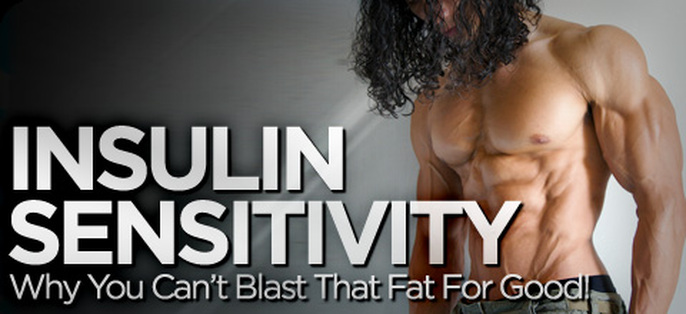 Have you reached the final fat loss plateau, tried everything and can't conquer it? Learn why Insulin Sensitivity is your biggest obstacle and how to defeat it to see the results!By: Paul EastwoodArticle Summary:As you become leaner your body will become more sensitive to insulin as a result.Of the macronutrients, fats are the best source of energy the body can receive.Your body actually needs very few carbohydrates to function properly day-to-day.
Insulin Sensitivity:
Why You Can't Blast That Fat For Good!Have you ever wondered why, after all the exercise and healthy eating you do, you still can't shift that last bit of fat? You hit the gym four to five times a week or more, you even try to get a run in over the weekend and on top of this you're eating all the healthiest food you can find; despite this your still not super lean like you want to be. I have the answer to your nightmare - Insulin sensitivity.
Insulin sensitivity will eventually replace the term "weight loss" and "fat loss" as the new hot topic. Insulin has a powerful ability to prevent fat breakdown by its anabolic (rebuilding) properties.
Few health and fitness professionals know or understand Insulin sensitivity (IS) which is why its no wonder that the every day man or woman is finding weight and fat so difficult to lose; it's incredibly hard to win against an obstacle you don't know is there!
Let me explain Insulin's role and how it's sensitivity changes depending upon how close you are to your weight and fat loss goals.
READ MORE:
 HEALTHY EATING STARTS AT HOME !By Chrissy Wellington M.S., C.N.S., L.D.N., C.P.T
Feeding your family a healthy dietcan be a challenge. Most people know that fruits, vegetables and whole grains are healthy, and parents hope that their children are getting enough nutrients, however, in the United States children ages 4 to 12 have influenced approximately 128 billion dollars in food spending. And most of that money is spent on junk food. Cartoons such as Tony the Tiger, Shrek, the Simpsons and Spider-Man encourage children to request not-so-healthy items too often.
Ellyn Satter, author of Secrets of Feeding a Healthy Family, says that responsibility lies with parents to supply the what, when and where of eating, while children are responsible for how much they eat.
Here are nine tips to make healthy eating a way of life for your kids, and to make mealtime simple, tasty and conflict free for the family.
READ MORE:
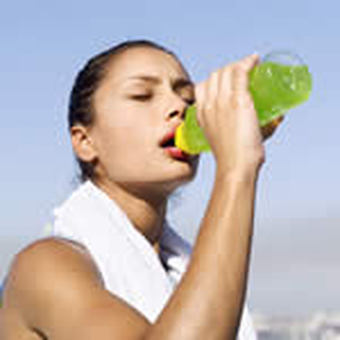 By Matt Fitzgerald
For Active.com
Unless you've been living in a cave, you've probably seen those television advertisements in which a leading sports drink maker claims its product "hydrates better than water." The fact that the message of these ads hasn't changed in many years suggests that a lot of athletes aren't buying it. But it's actually true.Why do sports drinks hydrate better than water? There are three reasons. First, fluids are absorbed through the gut and into the bloodstream faster when their osmolalityclosely matches that of body fluids such as blood.
Osmolality is the concentration of dissolved particles in a fluid. Sports drinks contain dissolved minerals (sodium, etc.) and carbohydrates, whereas water doesn't, so water doesn't reach the bloodstream as quickly.
Sodium and other nutrients also play important roles in regulating fluid balance in the body. In other words, they help determine how much fluid enters into muscle fibers and other cells, how much remains in the blood, and so forth. Again, because sports drinks contain these nutrients, they do a better job of allowing the body to maintain optimal fluid balance, which is an important aspect of hydration that few athletes consider.
A third advantage of sports drinks over water with respect to hydration is that the sodium content of sports drinks stimulates thirst, so athletes usually drink more when they have a sports drink than when they have plain water.
Choosing the Right Sports Drink
Not all sports drinks hydrate equally. Those that contain higher amounts of sodium are preferable, because they are absorbed quicker and maintain fluid balance in the blood and muscles better. Choose a sports drink that contains at least 15 mg of sodium per ounce.
New research suggests that sports drinks containing a small amount of protein may also hydrate better than conventional sports drinks. Protein is an often-overlooked nutrient that affects osmolality just as minerals and carbs do. Therefore the addition of protein to a sports drink has the potential to increase its absorption rate.
This was demonstrated in a recent study by exercise physiologists at San Antonio Catholic University in Murcia, Spain, and published in the Spanish Journal of Nuclear Medicine.
Twenty-four well-trained cyclists participated in the study. They were fed either of two sports drinks at rest and during a workout. Drink A was a conventional sports drink containing 15 grams of carbohydrate per 100 ml. Drink B contained 10 grams of carbohydrate per 100 ml plus proteins.
After 60 minutes of exercise, the researchers found that a significantly greater amount of drink B, containing carbs and protein, had been absorbed than drink A. These results indicate that a carb-protein sports drink may hydrate better than a conventional sports drink.
The addition of protein to a sports drink appears also to aid fluid retention. When a beverage is too dilute, it tends to pass quickly through the bloodstream to the bladder so it doesn't "water down" the blood and other body fluids.
New evidence suggests that the right amount of protein in a sports drink, in combination with the right amount of carbs and electrolytes, may boost fluid retention and help you hydrate better during exercise.
In a new study from St. Cloud State University, cyclists exercised until they lost two percent of their body weight and then consumed one of three beverages: a sports drink containing carbohydrate and protein in a 4:1 ratio; a conventional sports drink containing carbs and electrolytes but no protein; or water.
Over the next three hours, the investigators measured how much of each beverage was retained. Only 53 percent of the water was retained, versus 75 percent of the conventional sports drink and an amazing 88 percent of the carb-protein sports drink.
Other Advantages of Sports Drinks
Sports drinks have other advantages over water for athletes and exercisers that go beyond better hydration. Specifically, the calories in sports drinks have been shown to increase energy and endurance, limit the immune system suppression that sometimes follows hard workouts, reduce exercise-induced muscle damage, and promote faster recovery.
Water is by far the most popular fluid choice during exercise. However, sports drinks actually do a better job of hydration, while also providing other benefits that water does not. Water is a great drink choice outside of workouts, but during exercise you're much better off with a sports drink. In this case, there's truth in advertising.
This article was adapted by the author from The Cutting-Edge Runner: How to Use the Latest Science and Technology to Run Longer, Stronger, and Faster (Rodale). Clickhere to purchase a copy. http://www.active.com/running/Articles/Which_fluid_hydrates_best__Water_or_a_sports_drink_.htm?cmp=17-7-313
 Why is it the Most Important Meal of the day?Figuring out what kinds of foods to eat to help you lose fat or gain muscle can be difficult enough, what time to eat those foods should not be. The easiest way to gain muscle and lose fat is to eat breakfast. Obviously breakfast is meant to do exactly that break the fast. Breaking The FastThe involuntary fast that we go through while we are sleeping needs to be stopped so that our metabolism becomes revved up as early as possible. The National Weight Control Registry, a group that tracks the progress of people who have lost 30 lbs. or more and kept it off for over a year, reports that 78% of it’s members eat breakfast everyday and at least 90% eat breakfast 5 days a week. Eating a protein based breakfast also helps to start building muscle first thing in the morning after your muscle tissue has had a chance to rest and recover. There is really no downside to eating breakfast, weight loss, muscle gain and the needed energy to get you through the day.Good ChoicesIf you are already eating breakfast than my hat goes off to you. You are already enjoying the benefits of starting the day off on the right path. Hopefully you are not doing the fast food drive through. Steel cut Oatmeal, Turkey Bacon, Egg Whites or an early morning Protein Shake are just a few examples of what you should start your day off with. Stay tuned for our Special Articles specifically about what the best breakfast foods are for you to reach your goals fast!!! http://www.muscleandfitnesstrainer.com/home/articles/do-not-underestimate-the-importance-of
OverviewWhen trying to lose weight, your diet is important. You need to eat a diet that puts you in a calorie deficit, where you are consuming fewer calories than you burn. There is often a debate over which oil is best to use for cooking when trying to lose weight, as many oils are calorie dense or contain harmful ingredients. But coconut oil may be the best choice for cooking. CaloriesMost common cooking oils contain similar amounts of calories -- between 113 and 120 per tablespoon of oil. Coconut oil contains 120 calories per tablespoon, so it is at the higher end of the scale. But considering you will only consume it in small amounts, the extra calories are negligible. FatsThe fat in coconut is predominantly saturated. While saturated fat is often believed to be linked to heart disease, it plays a vital role in cell growth and hormone production. It is a stable fat, meaning it won't be denatured or turn rancid when exposed to high temperatures, which can happen with unsaturated fats. While polyunsaturated vegetable oils may be a popular choice for cooking, they have been linked with reducing levels of good HDL cholesterol, and have a poor omega-3 to omega-6 ratio, which may contribute to obesity, heart disease and ill health, according to nutritionist Brian St. Pierre. Health BenefitsAbout half of the saturated fat in coconut oil is lauric acid, which is a medium chain triglyceride, or MCT, fat. MCTs are thought to provide benefits to exercisers, as they are quickly converted to energy once ingested. Nutritionist and bodybuilder John Meadows says the fat in coconut oil is anti-viral and anti-microbial, and also promotes fat burning. TypesChoose the coconut oil that best fits your budget, but even a lower-quality oil like refined, bleached and deodorized contains MCTs and lauric acid, though in a slightly lower quantity than unrefined extra virgin coconut oil, which is the purest form you can get. The only type to avoid is fractioned coconut oil, which has had all the MCTs removed. Despite all its beneficial properties, coconut oil is still calorie dense, so stick to between 1 and 3 tablespoons per day. Read more: http://www.livestrong.com/article/388246-which-cooking-oil-is-best-for-weight-loss/#ixzz1Ft9ZSLeE
 By Cathy Garrard
Prevention
You know exercise makes you feel good. Why not feel great? Harnessing—and maximizing—the restorative powers of your workout can send your mood soaring and get you psyched for tomorrow's session.Prevention pored over the research and consulted experts, including PhDs and even a hypnotist, to find easy, effective strategies to keep you revved long after you've unlaced your walking shoes.
Drink Caffeine
This stimulant doesn't just give you the energy to start your workout: New research suggests that it may help you feel better once you're done, too. Women who consumed the equivalent of 2 1/2 cups of coffee an hour before a 30-minute bike ride reduced leg muscle pain by nearly half, compared with those who didn't have caffeine, according to a study published in Medicine & Science in Sports & Exercise. Caffeine appears to work on the inflammatory agent known as adenosine.
"It may block the chemical from binding to brain or muscle receptors associated with pain," says lead researcher Robert Motl, Ph.D., an assistant professor of kinesiology and community health at the University of Illinois at Urbana-Champaign. Even just a cup of joe might add some oomph to your moves while easing pain.
Use Your Nose
Stimulating scents wake up your brain and body, suggests a study at Wheeling Jesuit University. Athletes who walked on a treadmill for 15 minutes while inhaling a peppermint aroma felt more invigorated afterward than those who walked without smelling anything.
"Peppermint increases brain activity in areas that heighten alertness," says lead researcher Bryan Raudenbush, Ph.D., an associate professor of psychology. The rejuvenating scent can also help enhance your workout so you experience that natural high faster. Although sniffing peppermint produces the best results, you can get a boost from flavored gums, mints, or a beverage such as Metromint water.
Another feel-good fragrance? Jasmine. Raudenbush says inhaling the sweet aroma after exercise helps your heart rate and blood pressure return to normal more quickly as you cool down, allowing your body to recuperate faster from a tough workout.
 Monday 14 February 2011
Get a few pointers on how to boost up your metabolism to stay lean and shredded
Best Ways to Boost You Metabolism!
Chelsea Cruz Team Sci Fit
"Metabolism" has been the diamond in the rough for fitness freaks and dieters all over, but what really is your metabolism? Webster's defines it as, " the sum of the processes in the buildup and destruction of protoplasm; specifically : the chemical changes in living cells by which energy is provided for vital processes and activities and new material is assimilated" .... but in simpler terms, and in the fitness and health community, the word "metabolism" refers to how fast your cells burn through the energy (calories) it needs to perform basic functions and maintain life.
While the rate at which your metabolism function depends heavily upon genetics, age, and gender, there are several things you can do to take control of your metabolism to make your body a lean, mean, calorie burning machine.
1. BUILD MUSCLE:
Our bodies constantly burn calories, even when you think you are doing nothing. Your body needs calories to burn in order to breath, make your heart beat, maintain vital organ and muscle tissue etc. The resting metabolic rate is significantly higher in people with more muscle mass. Each pound of muscle in your body uses about 6 calories per day just to stay alive! But, every pound of fat in your body uses only 2 calories per day to maintain itself. That seemingly small difference adds up over time. Plus, after a tough resistance training workout, all your muscles are activated and burning even more calories throughout the day!
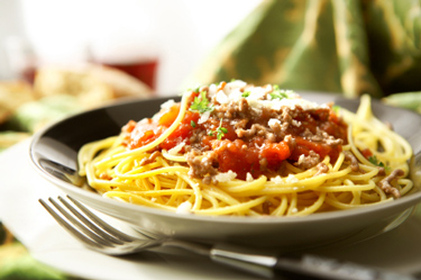 7 reasons why you shouldn't give up on themby Brynn ManninoIt's true that cutting chips, cookies, candy, and other carbs from your diet can help you uncover your abs. But if you think eliminating all the carbs is the key to reaching your weight-loss goals, we've got a few reasons to reconsider. 1.) Lousy AttitudeGoing too low-carb isn't just bad for your body, it's bad for your spirit. Extreme low-carb diets negatively impact your mood, says Jeannie Gazzainga-Moloo, Ph.D., R.D., a nutritionist in Sacramento, Calif. 2.) LazinessCarbs supply your muscles with the glycogen you need to hit the gym. "Without them, you may feel weaker and more apathetic about training hard," says Lona Sandon, R.D., assistant professor of nutrition at UT Southwestern. 3.) StupidityNot eating carbs could make you dumber, according to data from the U.S. Institute of Medicine. "Going too low carb can impair brain function and reduce your ability to concentrate properly," says Dawn Jackson Blatner, R.D., author of The Flexitarian Diet. 4.) A Slower MetabolismFueling your muscles with carbohydrates helps you get through exhausting fat-loss routines. "Your body needs a decent supply of carbs post-workout to keep that burn going as long as possible," says Amy Jamieson-Petonic, R.D., a nutritionist at the Cleveland Clinic. 5.) HungerSlow-digesting carbs like oatmeal take longer to enter your bloodstream and help satisfy your appetite much better than junk food. "Successfully curbing your appetite is essential for weight loss," says Sandon. 6.) A Speedy RecoveryAfter working out, your body needs carbs to repair your muscles and get stronger. Opt for a small meal of protein and carbs 30 to 60 minutes after training. "During that window of time, the body needs nutrients to replenish, rebuild, and repair muscle tissue for the next workout," says Sandon. 7.) The Bottom LineEating fewer calories will let you carb out in peace, according to a recent study in the New England Journal of Medicine. "Reduced-calorie diets, whether carbohydrate predominant or carbohydrate poor, a;; produce similar weight-loss results," says David W. Grotto, R.D., author of 101 Foods That Could Save Your Life. Carb CheckUltimately, your activity level should determine the amount of carbs you take in. Here's how to calculate your maximum daily allotment of the the muscle fuel: - Beginner/Sedentary Guys: 1 g/per pound of body weight
- Intermediate/Moderately Fit Guys: 2 g/per pound of body weight
- Advanced/Highly Active Guys: 3 g/per pound of body weight
Additional grams of carbs should be eaten 30 to 60 minutes before physical activity. http://www.mensfitness.com/nutrition/abs-health/keep-carbs
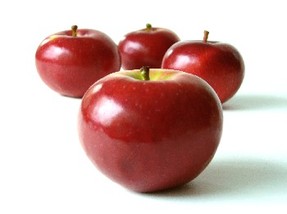 We're told that an apple a day keeps the doctor away, but what exactly are the health benefits of apples? Here are ten reasons to heed the advice of that old proverb.
Bone Protection
French researchers found that a flavanoid called phloridzin that is found only in apples may protect post-menopausal women from osteoporosis and may also increase bone density. Boron, another ingredient in apples, also strengthens bones.
Asthma Help
One recent study shows that children with asthma who drank apple juice on a daily basis suffered from less wheezing than children who drank apple juice only once per month. Another study showed that children born to women who eat a lot of apples during pregnancy have lower rates of asthma than children whose mothers ate few apples.
Alzheimer's Prevention
A study on mice at Cornell University found that the quercetin in apples may protect brain cells from the kind of free radical damage that may lead to Alzheimer's disease.
Lower Cholesterol
The pectin in apples lowers LDL ("bad") cholesterol. People who eat two apples per day may lower their cholesterol by as much as 16 percent.
Lung Cancer Prevention
According to a study of 10,000 people, those who ate the most apples had a 50 percent lower risk of developing lung cancer. Researchers believe this is due to the high levels of the flavonoids quercetin and naringin in apples.
Breast Cancer Prevention
A Cornell University study found that rats who ate one apple per day reduced their risk of breast cancer by 17 percent. Rats fed three apples per day reduced their risk by 39 percent and those fed six apples per day reduced their risk by 44 percent.
Colon Cancer Prevention
One study found that rats fed an extract from apple skins had a 43 percent lower risk of colon cancer. Other research shows that the pectin in apples reduces the risk of colon cancer and helps maintain a healthy digestive tract.
Liver Cancer Prevention
Research found that rats fed an extract from apple skins had a 57 percent lower risk of liver cancer.
Diabetes Management
The pectin in apples supplies galacturonic acid to the body which lowers the body's need for insulin and may help in the management of diabetes.
Weight Loss
A Brazilian study found that women who ate three apples or pears per day lost more weight while dieting than women who did not eat fruit while dieting.
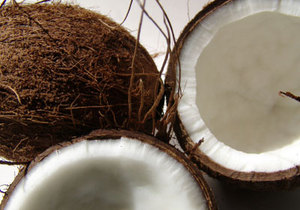 11/01/2010: Ted from Bangkok, Thailand writes: "Of all the cures I have written, nothing is as dramatically important for me as the coconut oil cure. What tipped me off to write this particular update occurred about the beginning of this year as I was trying to find a local source of bromelain (a protease enzyme commonly found in pineapples), when the owner of a factory gave me an industry secret in reducing death rates of piglets, by giving them a teaspoon of MCT (Middle Chain Triglyceride) mixed with a tiny bit of bromelain enzyme.
Normally farmers report a 50% survival rate for piglets, but when fed with this MCT and a small amount of bromelain, you have roughly 100% survival rates. The MCT happens to be found mostly in coconut oil. While bromelain is helpful, most of the survival rates actually came from the MCT. The content of coconut oil is the only oil that I am aware of that contains high levels of MCT. It contains 60%.
You might wonder what's all the fuss about MCT? That answer lies in the basics of cellular nutrition. In case you haven't figure it out, I consider the piglets' sudden death and Sudden Infant Death (SID), the condition that afflicts human babies, the same condition.
You see, if a baby doesn't have enough glucose in their blood, for a very short period, brain cells die quickly. The cell's prime nutrition requires actually two source of energy, one from glucose and another one from MCT in the form found in coconut oil. Ordinarily the body makes uses of MCT when eating coconut oil by the liver which converts it to ketone bodies. What's even more interesting, is the mitochondria - the energy centers of the cells - can actually directly access MCT right through the blood brain barrier and give the mitochondria the needed energy.
So babies born prematurely or starving babies can actually survive, if they have sufficient levels of MCT, where the mother could supply them through breast milk, after she eats coconut oil, or coconut oil is mixed in a milk formula or given directly, as in the piglets' case. The cells require energy and metabolism and have two sources, either glucose or a backup, MCT, if the glucose was in short supply even for a second. I have seen that people with low blood sugar for even a few seconds can faint. So the brain needs the backup system, and this comes from MCT. This allows a more stable energy source, much like the UPS (Uninterrupted Power System) should your glucose level be temporarily low. So the people who faint easily may actually have an MCT deficiency, which can be supplied from coconut oil.
What is so special about MCT and coconut oil is that brain cells DO NOT REQUIRE ANY special receptors to utilize this source of energy!
|










 RSS Feed
RSS Feed







